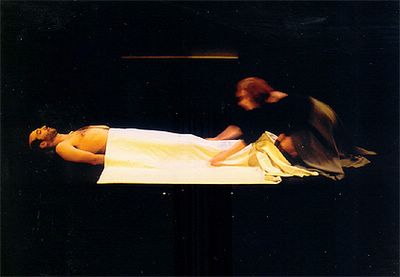
THEATRE/Athens (GR)
“Antigone: Worshipping the Dead”
Through April 19th
"So for me to meet this doom is trifling grief; but if I had
suffered my mother's son to lie in death an unburied corpse,
that would have grieved me; for this, I am not grieved."
Antigone, the daughter of Oedipus, king of Thebes in Greek legend, is the heroine of one of Sophocles' most powerful dramas.
According to legend, when Oedipus blinded himself, Antigone shared her father's exile near Athens.
After his death, she returned to Thebes and attempted, with her sister Ismene, to reconcile their quarrelling brothers Eteocles and Polynices.
Both brothers were killed in battle, but their uncle Creon, now king, forbade the burial of Polynices because he had betrayed Thebes.
When Antigone defied the edict of her uncle and secretly buried her brother, she was executed.

Shown above: Burial scene, "Antigone: Worshipping the Dead"
Sophocles used the plot and characters of this legend in his tragedy, “Antigone” (440 BC).
The plot revolves around Antigone's loyalty to her brother and her defiance of Creon's edict in order to obey a higher law of devotion.
As the play opens, her two brothers, Polynices and Eteocles, have both died as the result of Polynices' rebellion against Eteocles, the successor king of Thebes.
Creon, the new king, forbids Polynices' corpse to be buried. Out of respect to the dead, Antigone performs funeral rites despite the ban and is sentenced by Creon to be buried alive.
The play has often been interpreted as a justification for civil disobedience, and as a vindication of acts driven by the unwritten laws of conscience.
Related links:
Historical context: Antigone
Read the play: "Antigone"
Find it: Chytirio Theatre
44 Iera Odos (Keramikos)
Athens, Greece
Get info: +30-210-3412313, 3412822
Find out about dance/theatre events in other cities, in the FEB/MAR 2005 issue of "Arte Six."

<< Home